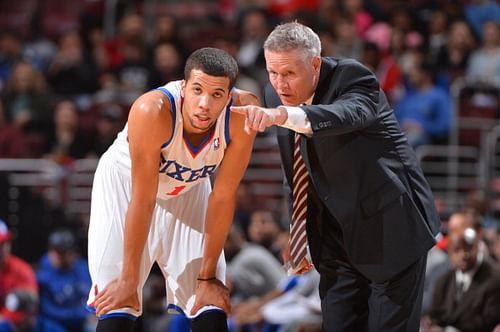
Tanking: NBA’s perennial self-sabotage tactic brought to the fore by the Philadelphia 76ers

Brett Brown of the Philadelphia 76ers talks with Michael Carter-Williams during a game. Is he asking him to deliberately underperform?
It is oddly amusing to watch the Philadelphia 76ers lose game after game in the most ridiculous fashion imaginable. The ineptitude of the team has become kind of an anomaly to watch. On any given night, the 76ers field only about two competitive players. The perfection with which they are executing their tanking mission has stirred up a lot of debate among the analysts and the general public alike.
The term ‘tanking’ in the NBA refers to a franchise throwing away its season in order to get a higher draft pick in the annual NBA draft lottery, the marquee event which initiates the inception of new young players ready for the NBA rigour. The way it works is that the more a team piles up its losses, the higher chance it gets of snagging the No. 1 overall pick every year. It is arguable that this technique does not always work, but isn’t it better to have a 25% chance of getting the first pick rather than having, say, a 10% chance? So in essence, the NBA might actually be the only sporting league which rewards losing.
The landscape of the NBA has changed drastically in the past few years. Analytics has become such a major part of the machination of an NBA franchise that the teams not willing to embrace the numbers are in danger of becoming obsolete. The implementation of the current “Collective Bargaining Agreement” (CBA) has put a choke-hold on team spending in quite a forceful manner. The aim was always to level the playing field, so that big spending teams like the New York Knicks and the Los Angeles Lakers do not snag every free agent out there by dangling the money carrot.
There is no hard cap as such in the NBA, the like of which is present in the NFL, but the imposition of hefty fines on teams exceeding the salary cap has every franchise in a conundrum. The repeater tax fine, which is imposed on a team if it is in violation of the salary cap regulations for two consecutive years, can put quite a bit of a dent in even the deepest pockets. This has resulted in the cropping up of a new, extremely cap savvy breed of general managers, who are money minded and treat draft picks as the best trade asset with which to strike deals.
The Cleveland Cavaliers are a fine example of tanking in all its glory. The absurd ways with which they ruin their franchise every year is topped only by the New York Knicks, who are a beacon of mismanagement. The Cavaliers have received three No. 1 draft picks since 2002, a direct by-product of their horrendous regular seasons. The Cavaliers got LeBron James, Kyrie Irving and Anthony Benett with those picks. Anthony Benett has pretty much proved a bust in the NBA, somebody who will most probably never be better than a rotation player.
The Cavaliers let James walk after repeatedly turning a deaf ear to his requests of surrounding him with a better supporting cast, and are on their way to piss off Kyrie Irving the same way. It will not come as a surprise if Irving walks the next time he becomes a free agent. You cannot put two players in the back-court who clearly want nothing to do with each other, and assume they will get you wins.
It is becoming increasingly rare to see long contracts in the NBA. Teams have become so wary of bad contracts that only certified superstars are being offered maximum level contracts. Cap clogging and minimal return contracts like the ones of Josh Smith and Rudy Gay are being shopped like never before, with teams wanting financial flexibility or at least something close to a return from players like them.
Rudy Gay has already been traded twice and the Pistons are clearly unhappy with Josh Smith’s monster deal, readily shopping him for spare change. But here is the thing; none of the other teams want anything to do with such contracts and such players. Cap space has become of such paramount importance to every team that accepting bad contracts such as the ones mentioned above is not feasible to them even if they lose night after night.